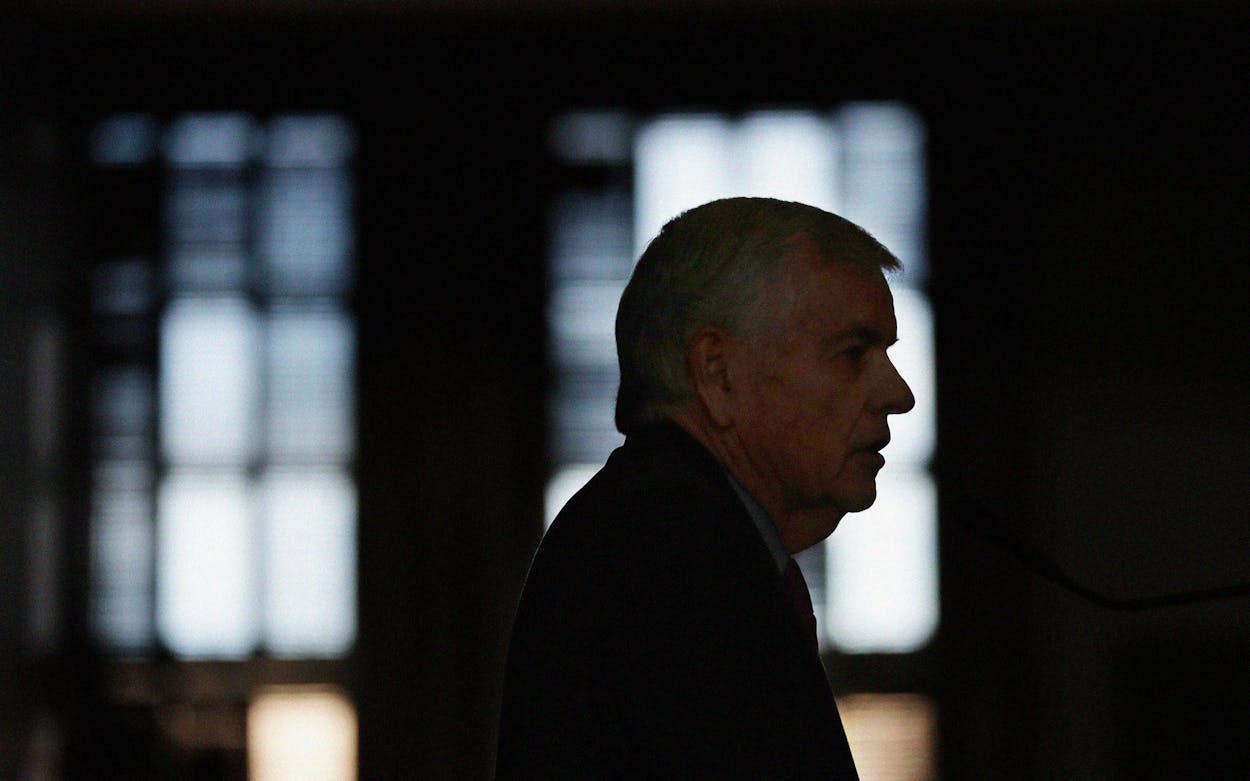Roxo Energy was a brand-new oil and gas developer that wanted in on the action in the Permian Basin. Founded by three former Texas Christian football players, it had capital but no place to put a rig. Then, in 2016, a golfing buddy of Todd Fitzgerald, the CEO, sent over a map of six thousand undrilled acres available near Big Spring. Was Roxo interested? Fitzgerald said he wanted to learn more. His friend connected him to the father and son representing the mineral owners: Tom Craddick, a state representative from Midland who served as the speaker of the Texas House in the early 2000s, and Tommy Craddick Jr.
In a couple initial phone calls, conversation centered on the father-and-son duo’s payment. “Tommy and Tom wanted to confirm a fee of some sort for them helping put the prospect together,” Fitzgerald said in a 2020 sworn deposition from a lawsuit involving a financial dispute between Roxo and the family that leased the acreage. “They asked for five hundred thousand.” Fitzgerald tried to negotiate the fee lower, but the Craddicks wouldn’t budge. He relented, and the Craddicks introduced him to the owners, three sisters who had inherited the land from their deceased father, an independent oilman named Kelly Baxter.
Fitzgerald paid the fee to Craddick Partners, a family partnership. According to Tommy Craddick’s deposition, Tom Craddick runs the partnership. There are three other partners: Tom’s wife, Nadine; Tommy; and his sister, Christi Craddick.
Christi is the chairman of the Railroad Commission of Texas, the state’s top oil regulator. In that role, she would oversee Roxo’s future drilling and producing activities. Meanwhile, Tom Craddick has been one of the state’s consummate oil industry wheeler-dealers for decades—even as he served as an elected representative from West Texas and sat on various legislative committees that oversaw energy matters. He often brings together Texans looking to lease their land with companies seeking to acquire oil leases, and he charges top dollar for leveraging his connections.
Tom Craddick has maintained that his fee for his work is typically paid in the form of a small stake in the lease. Earlier this year, Texas Monthly reported exactly how lucrative those stakes could be. In 2022 Craddick and his family’s interests in wells entitled them to about $10 million, according to an analysis of county tax and state oil records. A large percentage of those earnings were coming from the family partnership. It was not previously known that the partnership was also receiving large cash payments for facilitating deals, as it did in the Roxo Energy case.
Those few phone calls weren’t the end of the Craddicks’ participation in the deal, nor was the $500,000 the sum total of their compensation. Not long after his first phone call, Tommy Craddick hopped on a private jet from Austin to Fort Worth to attend a meeting at a law office to finalize the deal. But he mostly just observed the proceedings. “I wasn’t a part of the negotiations,” he said in the deposition. For his troubles, Tommy Craddick received another $150,000—from the family that owned the mineral lease.
That wasn’t the end of the Craddicks’ windfall. The lease had a problem: ExxonMobil owned overlapping mineral leases in the area, making it a minority partner in any drilling. According to depositions, Exxon had a list of companies with which it would participate in wells as a junior partner, and the year-old Roxo, which had never drilled a well, wasn’t on the list. Tom Craddick reached out to an Exxon official to give his imprimatur on the deal, according to testimony in the lawsuit. He then set up a call between Roxo and Exxon.
With this matter resolved, the three sisters each signed separate leases with Roxo, and they provided a 1 percent overriding royalty on the six thousand acres to Craddick Partners. This entitled the Craddick family to 1 percent of profits from any oil and gas extracted for as long as the lease remained in effect—a critical detail that would soon become very important.
It was a handsome payoff for a couple of phone calls. “Tommy was, basically, just a matchmaker. . . . Tommy put us together with Roxo,” Cole Stout, who negotiated on behalf of the three sisters who leased the acreage and is married to the eldest sister, testified at a trial last year. The deal flowed through the Craddicks, and without payments, Tommy Craddick made it clear he wouldn’t help get the deal done. “He just said that he wasn’t going to facilitate us meeting with Roxo, or Roxo meeting with XTO,” said Stout. (XTO is a subsidiary of Exxon that handles most of its leasing and drilling in the Permian Basin.)
Christi Craddick did not disclose any payments from Roxo on financial statements, although she did report receiving at least $166,210—and potentially a lot more—since 2018 from the family partnership. It is not known exactly how much the partnership distributes to each member of the Craddick family. Christi and Tom, both elected officials, disclose that they received more than the largest amount required to be disclosed by the Texas Ethics Commission, which changes annually and was $46,580 last year.
None of the Craddicks agreed to discuss the family partnership or the Roxo deal. Instead Tom issued a statement to Texas Monthly through Bill Miller, the cofounder of HillCo Partners, an Austin lobbying and public relations firm. “Speaker Craddick has fully reported his income on personal financial statements and complies with the letter and the spirit [of] all Texas laws of financial disclosure,” the statement said. “Speaker Craddick has been in the oil and gas business for decades. The Texas legislature is, by design, part-time so that members have professional careers and run a variety of businesses back in their districts.” Miller had previously told Texas Monthly that both Tom and Christi cast votes in their roles as policymakers to ensure the Texas oil and gas industry continues to generate jobs and promote energy independence.
Tom Craddick also uses his legislative office to try to protect his family in deals such as the Roxo one. A few months after the leases were signed, Roxo outright purchased the mineral rights from two of the sisters. (The third sister declined to sell.) Then the company filed paperwork in Big Spring stating that two of the original leases no longer existed, which meant that Craddick Partners’ 1 percent override also vanished. The maneuvering was what’s known as a “washout.”
Craddick Partners sold its remaining interest, for an undisclosed sum, in 2017 to Platform II LLC. Platform in turn sued Roxo for what it claimed was an illegal washout, and Craddick Partners joined the lawsuit, arguing it was still entitled to future royalties. On May 10, 2019, district judge Tim Yeats ruled that the washout wasn’t against the law.
That ruling came down during the waning days of the eighty-sixth session of the Texas Legislature. The next time the Legislature met, in 2021, Tom Craddick proposed twelve bills. One would have made it harder to “wash out” existing leases. If the washout was done in “bad faith”—to simply extinguish a mineral owner’s claim to a small percentage of the lease—then mineral owners, such as Craddick Partners and Platform II, could bring a lawsuit. The Craddick family owns hundreds of these overriding royalties.
When the House Judiciary & Civil Jurisprudence Committee met that year, only one witness other than Craddick spoke in favor of the bill, a lawyer named Reagan Marble. Although he didn’t mention it, Marble had represented Craddick and Platform II in their unsuccessful lawsuit against Roxo. “I am here testifying in my individual capacity,” he told the committee. Days later the legislation was passed by the House, and then by the Senate, but it was vetoed by Governor Greg Abbott, who said the bill would result in “enriching lawyers through costly litigation.”
When the Legislature reconvened in 2023, Craddick again introduced the bill, with the exact same language. At a hearing in March, he testified that the law wouldn’t personally benefit him, despite his owning hundreds of overriding royalties subject to washouts. “I had somebody say, ‘Well, does this affect you?’ No, no it doesn’t. So I want that clear. I’m not doing this for myself,” he said. (It is not clear what he meant by this, since the bill would provide future legal protection for his overriding royalty interests.) Again, the only person testifying in favor of the bill was Marble. He testified that he had been a lawyer in “two dozen overriding royalty interest washout cases over the years” but didn’t mention that one involved the lawmaker sitting to his right.
This time Craddick was successful. The bill once again passed the Texas House and Senate, and Abbott let it become law. The Governor didn’t explain why he changed his mind and didn’t respond to an interview request. The bill will become law in September.
Disclosure: The chairman of Texas Monthly, Randa Duncan Williams, also serves as chairman of the general partner of Enterprise Products Partners L.P. As a major pipeline owner and operator, Enterprise sometimes has cases before the Railroad Commission. Enterprise’s political action committee contributed $10,000 to Christi Craddick’s campaign in 2021.
Correction May 22, 2023: An earlier version of this article reported that Governor Abbott had signed HB 450 into law. This story has been updated to reflect that the governor let it become law without his signature.
- More About:
- Politics & Policy
- Energy
- Texas Legislature
- Tom Craddick








